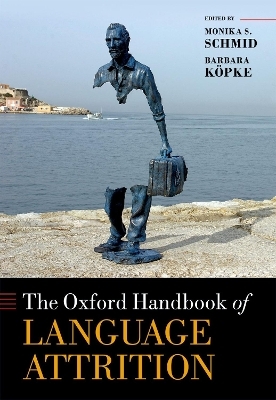
The Oxford Handbook of Language Attrition
Oxford University Press (Verlag)
978-0-19-879359-5 (ISBN)
This volume is the first handbook dedicated to language attrition, the study of how a speaker's language may be affected by crosslinguistic interference and non-use. The effects of language attrition can be felt in all aspects of language knowledge, processing, and production, and can offer unique insights into the mind of bilingual language users. In this book, international experts in the field explore a comprehensive range of topics in language attrition, examining its theoretical implications, psycho- and neurolinguistic approaches, linguistic and extralinguistic factors, L2 attrition, and heritage languages. The chapters summarize current research and draw on insights from related fields such as child language development, language contact, language change, pathological developments, and second language acquisition.
Monika S. Schmid is Professor of Linguistics at the University of Essex, having previously held positions at the Vrije Universiteit Amsterdam and the Rijksuniversiteit Groningen. Her research focuses on various aspects of first language attrition and has been published in journals such as Bilingualism: Language and Cognition and Applied Psycholinguistics. She is the author of several books including Language Attrition (CUP, 2011) and First Language Attrition, Use, and Maintenance: The Case of German Jews in Anglophone Countries (Benjamins, 2002). Barbara Köpke is Professor of Neuropsycholinguistics at the University of Toulouse 2 and head of the Octogone-Lordat Laboratory. Her research involves neuro- and psycholinguistic aspects of language processing in bilingual subjects with specific attention to 'extreme' situations such as L1 attrition, simultaneous interpreting, and aphasia. Her work has appeared in journals such as Language, Interaction and Acquisition and International Journal of Bilingualism, and she is the editor of a special issue of Journal of Neurolinguistics on first language attrition. Monika S. Schmid and Barbara Köpke are co-editors, with Merel C. J. Keijzer and Susan Dostert, of Language Attrition: Theoretical Perspectives (Benjamins, 2007).
1: Monika S. Schmid and Barbara Köpke: Introduction
Part I: Theoretical Implications of Language Attrition
2: Brian MacWhinney: Language attrition and the Competition Model
3: Michael T. Putnam, Silvia Perez-Cortes, and Liliana Sanchez: Language attrition and the Feature Reassembly Hypothesis
4: Gloria Chamorro and Antonella Sorace: The Interface Hypothesis as a framework for studying L1 attrition
5: Roumyana Slabakova: Implications of the Bottleneck Hypothesis for language attrition
6: Conny Opitz: A Complex Dynamic Systems perspective on personal background variables in L1 attrition
Part II: Psycholinguistic and Neurolinguistic Approaches to Language Attrition
7: Barbara Köpke & Merel Keijzer: Psycholinguistic and neurolinguistic approaches to language attrition
8: Michael Sharwood Smith: Language attrition as a special case of processing change: A wider cognitive perspective
9: Jared A. Linck and Judith F. Kroll: Memory retrieval and language attrition: Language loss or manifestations of a dynamic system?
10: Paola E. Dussias, Jorge Valdés Kroff, Michael Johns, and Álvaro Villegas: How bilingualism affects syntactic processing in the native language: Evidence from eye movements
11: Elma Blom, Tessel Boersma, and Jan de Jong: First language attrition and Developmental Language Disorder
12: Eve Higby, Aviva Lerman, Marta Korytkowska, Taryn Malcolm, and Loraine K. Obler: Aging as a confound in language attrition research: Lexical retrieval, language use, and cognitive and neural changes
13: Melissa Barkat-Defradas, Frédérique Gayraud, Barbara Köpke, and Laurent Lefebvre: Linguistic regression in bilingual patients with Alzheimer's disease
14: Karsten Steinhauer and Kristina Kasparian: Electrophysiological approaches to L1 attrition
15: Eleonora Rossi, Yanina Prystauka, and Michele T. Diaz: Neuroimaging perspectives on L1 attrition and language change
Part III: Linguistic factors in language attrition
16: Monika S. Schmid and Esther de Leeuw: Introduction to linguistic factors in language attrition
17: Charles B. Chang: Phonetic drift
18: Esther de Leeuw: Phonetic attrition
19: Chiara Celata: Phonological attrition
20: Elena Schmitt: Morphological attrition
21: Scott Jarvis: Lexical attrition
22: Ayşe Gürel: Null and overt pronouns in attrition
Part IV: Extralinguistic Factors in Language Attrition
23: Monika S. Schmid and Mirela Cherciov: Introduction to extralinguistic factors in language attrition
24: Emanuel Bylund: Age effects in language attrition
25: Monika S. Schmid: The impact of frequency of use and length of residence on L1 attrition
26: Gülsen Yılmaz: L1 attrition, L2 development, and integration
27: Claudia Maria Riehl: Language contact and language attrition
Part V: Second Language Attrition
28: Teodora H. Mehotcheva and Barbara Köpke: Introduction to L2 attrition
29: Teodora H. Mehotcheva and Kleopatra Mytara: Exploring the impact of extra-linguistic factors on L2/FL attrition
30: Kathleen Bardovi-Harlig and David Stringer: Syntax and phonology in L2 attrition: Modularity and resilience
31: Jenifer Larson-Hall: L2 lexical attrition
32: Hideyuki Taura: Attrition studies on Japanese returnees
33: Lee Osterhout, Ilona Pitkänen, and Judith McLaughlin: Event-related potentials as metrics of foreign-language learning and loss
Part VI: Heritage Languages
34: Silvina Montrul and Maria Polinsky: Inroduction to heritage language development
35: Sharon Unsworth: Quantifying language experience in heritage language development
36: Fatih Bayram, Diego Pascual y Cabo, and Jason Rothman: Intra-generational attrition: Contributions to heritage speaker competence
37: Tanja Kupisch: 2L1 simultaneous bilinguals as heritage speakers
38: Lara J. Pierce, Fred Genesee, and Denise Klein: Language loss and language learning in internationally-adopted children: Evidence from behaviour and the brain
39: Janet S. Oh, Terry Kit-fong Au, Sun-Ah Jun, and Richard M. Lee: Childhood language memory in adult heritage language (re)learners
40: Cristina Flores: Language development in bilingual returnees
Kees de Bot: Concluding remarks
Monika S. Schmid: Annotated bibliography
References
Index
| Erscheinungsdatum | 20.08.2019 |
|---|---|
| Reihe/Serie | Oxford Handbooks |
| Verlagsort | Oxford |
| Sprache | englisch |
| Maße | 171 x 246 mm |
| Gewicht | 1410 g |
| Themenwelt | Geisteswissenschaften ► Sprach- / Literaturwissenschaft ► Sprachwissenschaft |
| ISBN-10 | 0-19-879359-6 / 0198793596 |
| ISBN-13 | 978-0-19-879359-5 / 9780198793595 |
| Zustand | Neuware |
| Informationen gemäß Produktsicherheitsverordnung (GPSR) | |
| Haben Sie eine Frage zum Produkt? |
aus dem Bereich


